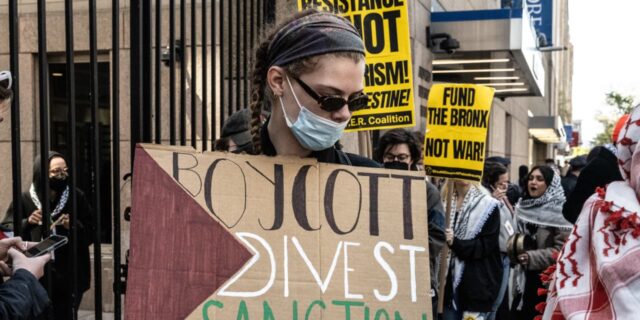Protests over the war between Israel and Hamas have swept Columbia University and several other prominent U.S. campuses. So have calls for university endowments to drop Israeli investments, a movement known as BDS, or Boycott, Divestment, and Sanctions.
But steering Columbia’s endowment—or one from another top university—away from Israel would be a lot harder and slower than student protesters hope. And it poses far more challenges than divesting from other protest targets like oil-and-gas companies.
One big reason: While selling stocks and bonds issued by Israeli companies would be relatively straightforward, those investments represent a relatively small minority of what big university endowments typically own in their portfolios.
Most major endowments prefer alternative investments, such as private equity, real estate, and hedge funds—which can have investments anywhere in the world. These tend to be far more opaque and can take years to unwind, even when universities are on board with student demands.
Columbia—facing so much unrest that it went to a hybrid learning model—doesn’t appear eager to exit its Israeli investments. While Columbia College students approved a referendum to divest this week, according to the student newspaper, a university board had previously rejected the idea as recently as February.
Advertisement – Scroll to Continue
Even if Columbia were to divest, its exposure to Israeli companies is likely quite small. Israeli companies represent less than 1% of the value of all stocks across the globe. In 2023 Columbia’s $13 billion endowment had just 24% invested in U.S. and foreign stocks, while 26% was in private equity, 30% in hedge funds, and the rest in bonds, real assets, and cash, according to its latest annual report.
Columbia’s past efforts to divest assets in areas targeted by protests show the process isn’t necessarily simple.
For instance, Columbia said it would exit oil-and-gas companies in 2021. The university announced right away that it held no direct investments in publicly traded oil-and-gas companies. But as for private funds—the majority of its investments—Columbia merely said it would make no new investments in private funds that primarily invest in oil-and-gas companies and exit them as they matured.
Advertisement – Scroll to Continue
Calls for endowment portfolio managers to take on moral causes have been a feature of protests since the 1980s. Columbia made headlines in 1985 when it committed to selling $39 million in stock of U.S. companies doing business in South Africa. The success of the antiapartheid campaigns helped ensure divestment would be a tool sought by future generations of activists.
The BDS movement targeting Israel also goes back decades. And it has long been controversial: Critics of BDS say it aims to delegitimize the state of Israel and most university administrations have rejected it.
Endowments have changed dramatically, moreover. That’s thanks in large part to the so-called Yale Model pioneered by that university’s innovative portfolio manager David Swensen in the 1990s. Swensen took advantage of his university’s deep pockets and long time horizon to seek private and illiquid investments like leveraged buyouts and timber. Yale’s returns handily beat the market, and Swensen’s methods were soon imitated, helping Ivy League endowments grow into the multibillion-dollar behemoths they are today.
Advertisement – Scroll to Continue
As a result of that approach, most university portfolio managers aren’t picking investments themselves. They tend to rely on outside managers—limiting their immediate control over buy and sell decisions.
When it comes to private equity, investors may have to wait years to exit—with lockup periods stretching for a decade or more.
None of this may satisfy students, but it illustrates the fact that even if universities like Columbia were to make a symbolic gesture to BDS—politically fraught as it is—it is likely to accomplish very little and wouldn’t happen soon.
Write to Ian Salisbury at ian.salisbury@barrons.com




